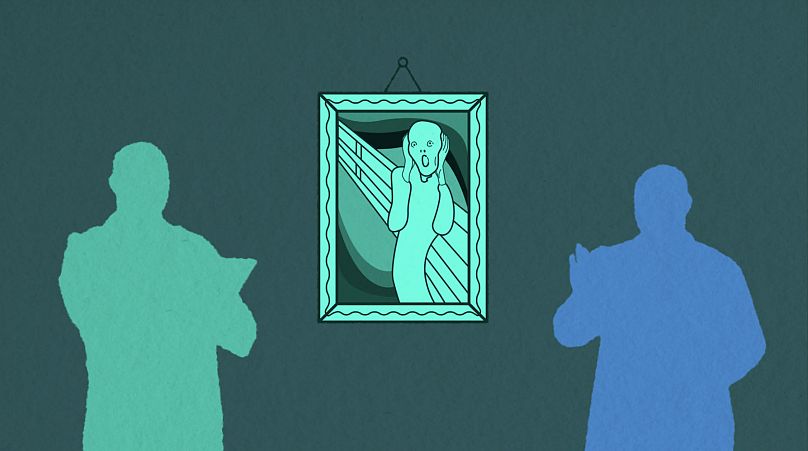The world has got better this week, thanks to science and passionate humans.
This is your weekly good news round-up.
Click the video above to get the full digest and find out more on the following:
Scientists have found a treatment that might finally put an end to recurring nightmares; camera-equipped sharks have mapped the largest seagrass meadow yet discovered; a new record label is bringing forgotten female composers out of obscurity; Barcelona’s environmentally friendly school ‘bus’; and the green school in South Africa that should inspire you to act on your dreams.
Here are all the details:
1. Scientists have found a treatment that might finally put an end to recurring nightmares
Two techniques have huge potential for helping people who suffer from sleep terror and recurring nightmares.
The first is imagery rehearsal therapy or IRT. In it, people must recall their nightmares and change the negative storyline within them to give it a positive spin.
For about 30 per cent of patients, rehearsing this affirmative dream scenario during the day has been proven to reduce nightmares after two or three weeks.
What about the remaining 70 per cent?
This is where something called targeted memory reactivation comes in, or TMR.
TMR is a process during which a person focuses on learning something (such as the positive nightmare spin) while listening to a specific sound, which is then played again as a cue while the person sleeps.
For those who tested a combination of IRT and TMR, the bad dreams almost completely disappeared, with the average number of nightmares dropping from three to 0.2 a week.
Find out more about the research to end nightmares here, written by Giulia Carbonaro for NEXT, the future-focused section of Euronews.
2. Camera-equipped sharks have mapped the largest seagrass meadow yet discovered
Swimming through the deep like underwater Google Street View cars, a group of eight sharks with biodegradable cameras attached to their dorsal fins has mapped out 92,000 square kilometres of seagrass in the Bahamas. This is twice the size of the previous largest-known seagrass meadow, in Australia's Great Barrier Reef.
Seagrasses sequester 10 times more carbon per hectare than the Amazon rainforest, making this newly discovered area one of the world's largest carbon reservoirs.
“The Bahamas banks is such a huge environment that is impossible to cover by human divers, so the tiger sharks have actually been scouting [it] for us,” says Dr. Carlos Duarte, science and policy advisor for the board of Beneath the Waves, the organisation leading the initiative.
Duarte says the discovery is a remarkable demonstration of “how little we still know about the ocean” and that it is a call for action to invest more in exploring the big blue, as there can be major benefits.
One of the things that Beneath the Waves has learnt from the experiment is that tiger sharks spent significantly more time in areas where there were seagrass meadows.
Sharks have been protected in the Bahamas for almost 30 years, “…and we now know that the seagrass meadow could really have very large ecosystem services and economic benefits for the people of the Bahamas, so it's really not much of a stretch to say that if you protect the sharks, you can protect the humans,” says Austin J. Gallagher, lead scientist and CEO of Beneath the Waves.
3. A new record label is bringing forgotten female composers out of obscurity
French cellist Héloïse Luzzati had spent around three decades studying and performing classical music, until she realised she was only ever performing work created by men.
The contribution that women have made to classical music receives barely any acknowledgement. Few works by women are published and therefore even fewer are recorded.
The problem, Luzzati says, is that “a book can be read, and a painting looked at, but music, if it is not played or recorded, will cease to exist.”
So Luzzati founded La Boîte à Pépites, a record label dedicated to resurrecting women composers from obscurity.
The first release was a three-CD box set of work by late French composer Charlotte Sohy, who died in 1955 and published music under her grandfather’s name to avoid prejudice.
The initiative also includes a festival – ‘Elles – Women Composers’, as well as a YouTube channel to highlight the work of little-known female composers.
4. Barcelona’s environmentally friendly school ‘bus’
A new school transport scheme, the Bicibús, is taking Barcelona by storm, with a peloton of happy kids cycling to and from school.
“The aim is to accompany the children safely to school, while at the same time, they get a chance to have a sense of belonging to a group,” says Helena Vilardell, founder Canvis en Cadena, the organisation behind the Bicibús initiative.
The guardian cyclists – parents, teachers and other volunteers – pick up kids along the route and drop them off, just like a traditional school bus.
The initiative was rolled out in September 2021, and already has more than 1,200 kids mass-pedalling to more than 70 schools across 25 cities in Catalonia.
The best part? It is highly replicable, organised by family associations and schools, good for the children and great for the environment.
Children even report enjoying cycling on rainy days, because it is fun "to ride through puddles".
“In the car, there’s a roof, and you can’t see the sky," reports another child in a video by Bicibús on YouTube.
5. The green school in South Africa that should inspire you to act on your dreams.
The Good News human pick of the week is Alba Brandt, a South African woman on a mission.
After spending six months in Bali, Indonesia, on a family adventure with her husband and three daughters, they decided to create South Africa's first ‘green school’, based on a similar school the children had attended in Bali.
“We really wanted to create that same experience for our children in our local context. We love living in South Africa. So we came back. We searched for land. We designed the campus we built during COVID. And we opened last year to 2021,” says Brandt, co-founder of the "Green School" with her husband.
“Our kids could then continue with a Green School curriculum that's based on joy and wonder, and very much teaching children and families and the teachers how we can live sustainably on this planet.”
The Green School is the first of its kind in South Africa; it aims to raise a new generation of environmentally conscious citizens, fostering children's creativity and resilience in the face of climate disruption.
Sara Samanani, a 14-year-old student at the school, says she was at first a bit “sceptical”.
“I was like, will I really be doing what I need to do at this time in life? But then I realised we're still learning the same things, just I think in a generally better environment.”
Samanani says the way the teaching is done at the Green School has improved her focus. “We have breaks. We have time where we can talk; we talk to our teachers like they're our friends," she says.
If you liked this Good News round-up, like this video, leave us a comment and share it with your friends. And always remember, some news can be good news.













